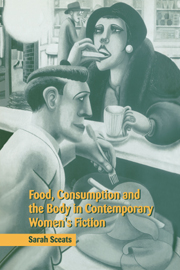Book contents
- Frontmatter
- Contents
- Acknowledgements
- Introduction
- Chapter 1 The food of love: mothering, feeding, eating and desire
- Chapter 2 Cannibalism and Carter: fantasies of omnipotence
- Chapter 3 Eating, starving and the body: Doris Lessing and others
- Chapter 4 Sharp appetites: Margaret Atwood's consuming politics
- Chapter 5 Food and manners: Roberts and Ellis
- Chapter 6 Social eating: identity, communion and difference
- Conclusion
- Notes
- Bibliography
- Index
Chapter 2 - Cannibalism and Carter: fantasies of omnipotence
Published online by Cambridge University Press: 22 September 2009
- Frontmatter
- Contents
- Acknowledgements
- Introduction
- Chapter 1 The food of love: mothering, feeding, eating and desire
- Chapter 2 Cannibalism and Carter: fantasies of omnipotence
- Chapter 3 Eating, starving and the body: Doris Lessing and others
- Chapter 4 Sharp appetites: Margaret Atwood's consuming politics
- Chapter 5 Food and manners: Roberts and Ellis
- Chapter 6 Social eating: identity, communion and difference
- Conclusion
- Notes
- Bibliography
- Index
Summary
The connotations of ‘cannibalism’ imply a cultural archetype, conjuring up irredeemably savage, most primitive and distant tribes, or the pathological disintegration of personality and social order. Such archetypal images of cannibalism are propagated, teased and tested in periodic macabre prosecutions that hit the headlines and account for something of people's horrified fascination with the subject, fuelled in popular novels and films such as Alive!; The Silence of the Lambs; The Cook, the Thief, his Wife and her Lover and Delicatessen. Notwithstanding the publicity, cannibalism in this culture remains, as Margaret Atwood puts it ‘the taboo of taboos’. However much sexual prohibitions are eroded – bestiality, sado-masochism and incest becoming admissible, if not approved – cannibalism remains firmly outside the pale. It may be joked about, rendered harmless by humorous packaging or speculated about in the most abstract way (‘If you were shipwrecked, would you …?’) but it is not permissible. Eating people, it seems, is simply and absolutely wrong.
Yet cannibalism is close to being a primary image: the suckling child connotes consumption by the flesh of our flesh, devouring a bodily substance emanating from the breast that psychoanalytic theory tells us is not yet known to be separate from the self.
- Type
- Chapter
- Information
- Publisher: Cambridge University PressPrint publication year: 2000



